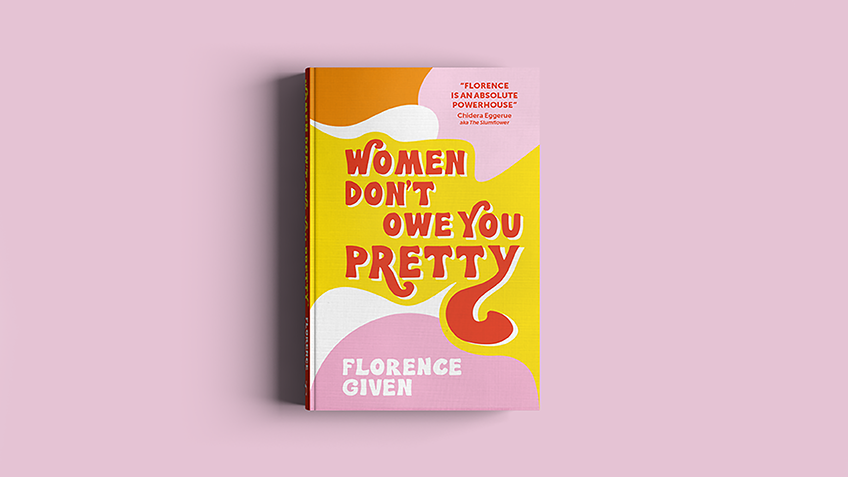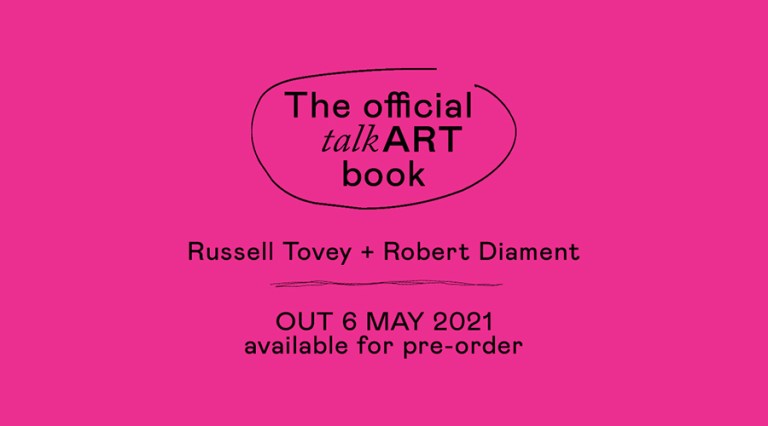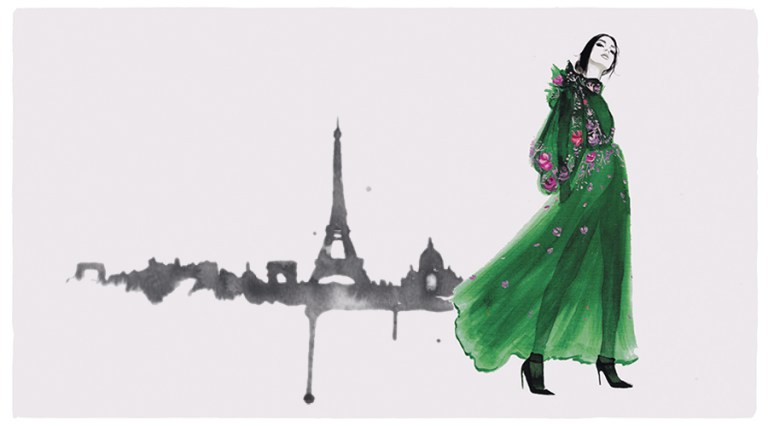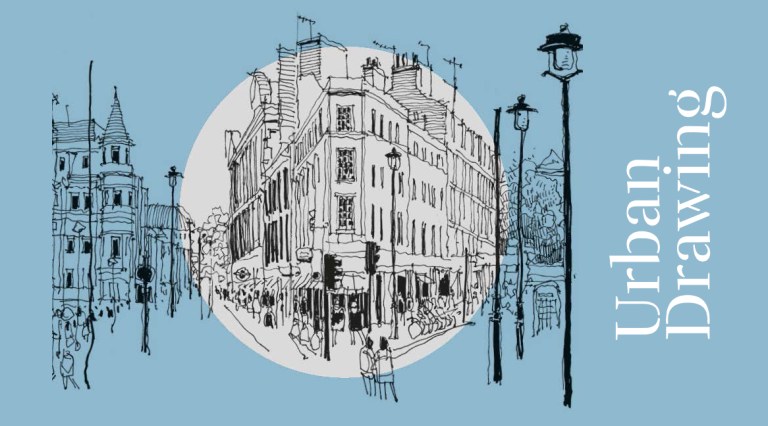Women don’t owe you pretty

Florence Given is a 21-year-old artist, activist and writer. In her newly published book Women Don’t Owe you Pretty, Florence addresses social issues and challenges out-dated narratives supplied to us by the patriarchy. Full of unique and playful illustrations, this book will remind you that you owe men nothing… least of all pretty.
“You don’t owe prettiness to anyone. Not to your boyfriend/ spouse/partner, not to your co-workers, especially not to random men on the street. You don’t owe it to your mother, you don’t owe it to your children, you don’t owe it to civilisation in general. Prettiness is not a rent you pay for occupying a space marked ‘female’” – Erin McKean
This quote changed my life and inspired the title of this book. Throughout feminist history, women have expanded on the concept of prettiness as a currency from their different standpoints, and there are a lot of variations on this idea out there. For example, Naomi Wolf’s book The Beauty Myth unpacks in-depth how our beauty standards are linked to capitalism; Chidera Eggerue touches on prettiness in her book What a Time to Be Alone and in her #SaggyBoobsMatter movement to promote a message of anti-perfection; and trans activist Janet Mock speaks on how she felt she gained pretty privilege as she began her transition. This book – Women Don’t Owe You Pretty – is my interpretation.
 This phrase sent me on a journey of unpacking my identity, forcing me to properly examine myself for the first time and ask why the hell I was carrying out these invasive, expensive, time-consuming and at times painful beauty rituals. I realised how much of my self-worth was determined by whether or not I appeared desirable to men, and whether that prettiness would be enough to encourage them to treat me with respect. But most of the time the attention that my “pretiness” garnered meant that men viewed me as an object, and men don’t respect objects. After all, objects are something we view to be used without reciprocity – it’s a one-sided relationship. It’s why they didn’t handle my rejection well and called me names like “frigid”, because objects aren’t supposed to be empowered. They’re objects. Acknowledging this was both uncomfortable and liberating – exactly what growth is supposed to feel like.
This phrase sent me on a journey of unpacking my identity, forcing me to properly examine myself for the first time and ask why the hell I was carrying out these invasive, expensive, time-consuming and at times painful beauty rituals. I realised how much of my self-worth was determined by whether or not I appeared desirable to men, and whether that prettiness would be enough to encourage them to treat me with respect. But most of the time the attention that my “pretiness” garnered meant that men viewed me as an object, and men don’t respect objects. After all, objects are something we view to be used without reciprocity – it’s a one-sided relationship. It’s why they didn’t handle my rejection well and called me names like “frigid”, because objects aren’t supposed to be empowered. They’re objects. Acknowledging this was both uncomfortable and liberating – exactly what growth is supposed to feel like.
This phrase also forced me to examine the kinds of standards against which someone’s “prettiness” is measured, and what “pretty” constitutes. Our collective idea of what makes someone pretty in society is based on their proximity to whiteness, thinness, being non-disabled and being cisgender. This helped me to see how my own prettiness has enabled me opportunities, opportunities that women who fall outside of what society deems as pretty have to work harder for. Whether I thought I was attractive or not, for the first time I had to acknowledge the objective fact that I sit high on society’s scale of desirability, by being slim, non-disabled and white. As women we don’t want to admit that we have “pretty privilege” because we have been taught that we should be unaware of our beauty, and to respond to compliments with self-deprecation and remarks such as “No I’m not, look at my…[points to ‘flaws’]!” In order to acknowledge that we have this privilege, we must first call ourselves pretty. Which, due to insecurity, is near impossible for most women. This is how our desirability privilege is silently maintained, and how as a society we continue to go about de-politicising our dating preferences as if they aren’t problematic and heavily loaded with racist, fatphobic and sexist bias.
There’s a discussion about whether desirability really is a privilege, since its benefits are rooted in the objectification of our bodies, not respecting them. My prettiness is both the thing that allows people to treat me better, and also the thing that has led to the most traumatic experiences of my life. Men don’t look at pretty women on the street and think “She’s pretty, so I won’t sexually harass her or follow her home.” It’s the opposite. I walk about life with constant vigilance – anxious for the next man to stick his head out his car window and shout something at me, spike the drink that my “prettiness” encouraged him to buy for me – and stop in a shop before I go home to check I’m not being followed. Keys between my fingers, heart racing, checking over my shoulder, strategising my safest route home even if it means spending money on a taxi – this is what navigating public spaces looks like for a lot of women. I can’t tell you the amount of times I have contemplated shaving my head to rid me of male attention and sexual harassment almost entirely overnight. But I realised that to do so would imply that it’s my responsibility to prevent this harassment, not theirs.
I was taught how to count calories, have boundaries with and say “no” to food as a young girl, before I learned about the importance of having boundaries and saying “no” to other people. What do you think that taught me about being a woman in this world? I learned that it was more important for me to be an object of desire, than it was to have my own needs met and be respected as a person. These harmful belief systems and low self-esteem landed me in abusive relationships as my boundaries were non-existent and I didn’t believe I deserved better. I was just happy that someone wanted me. I often wonder what my life would look like if I had learned that my body belongs to me, and me alone, first; that the way my body looks and its purpose is not to please others. I wonder what my life would look like if I had understood that I do not owe anybody “nice”, “perfect”, “petite” or “pretty”; that the best version of myself is not the one that is broken down in order to fit into the room afforded for women in a man’s world, but is the version that stays whole in spite of other people’s reactions – whether there is space for me or not.
Instead, I killed, squashed and minimised parts of who I really was in favour of the validation I craved, living to please everyone but myself – and I don’t want you to feel as though you have to do the same. This is the book I wish I could have whacked myself over the head with before the world’s toxicity permeated its way into my life.

Here’s what a conversation between my younger self and older self would have sounded like.
Older Floss: Floss – why are you stuffing your bra and skipping breakfast?
Younger Floss: Because that’s what boys like! Skinny girls with big tits.
OF: Okay Floss, can I have a word?
YF: Yeah, what’s the problem?
OF: I understand why you feel the way you do, but…
YF: Yeah? All the popular girls are doing it.
OF: Well, what you do with your body is your choice and your choice only. But I think it’s really important for you to understand the real reason behind your choices. Because what you’re doing to yourself is actually very unhealthy. Can you tell me why you’re skipping meals? What’s your reason behind this?
YF: Because “nothing tastes as good as skinny feels”! I’m not doing it for men. I just like the way it looks.
OF: Jesus. Okay. First of all, I know you’re in 2013 right now, but it’s 2020 where I am and Kate Moss herself has since publicly regretted ever saying that. Your weight does not define you and it is not a measure of your beauty, that concept is now OBSOLETE. Second of all, the reason you want to do this to yourself may not be consciously motivated by wanting to attract men, but our collective idea as a society of what is “pretty” and “desirable” is informed entirely by racism, sexism, fatphobia, disablism, transphobia and male desire. So even though you’re doing it “because you want to”, the reason you think big boobs and skinniness is beautiful is because it’s what men want, and we consume their ideas of beauty through the media, films and television. Do you notice how boys just show up to school in their uniform, with scruffy hair and sleep in their eyes?
YF: But it’s just different for bo… Oh. I see. Yeah I guess that’s not fair, is it?
OF: No, it isn’t. While the boys get to wake up ten minutes before school starts, put on their uniform and scoff down their breakfast, you spend an entire morning looking in the mirror making yourself up in a way that you hope those same boys would desire you, skipping your breakfast in an attempt to be a slim, pretty object of their affection. You must be exhausted. Have you ever thought about what you could do with that extra time? Have you ever wondered what your life might look like if you just showed up, as you are?
YF: Wow, I hadn’t thought of it like that. I guess it would be easier if I could just roll out of bed and turn up…but still, all the popular girls do it and I want to be popular! Life is easier when I make myself look pretty! It’s normal – all the girls in the magazines and movies who get the guy are the prettiest. All the men want to date them!
OF: And why do you feel so strongly that men need to desire you?
YF: Doesn’t every woman feel that way? I thought that’s just the way the world works…women make themselves pretty so men can desire them.
OF: So, you believe a woman’s worth is tied up in her ability to be pretty?
YF: I never thought about it like that. I guess, maybe I do…
OF: So, if you feel that way, and you believe that your worth as a woman is tied up in your beauty, how do you feel about women who aren’t pretty? Do you look down on them? Do you think they’re worthless? YF: I don’t think I do. But perhaps…
OF: Do you feel you make yourself look this way because you like it, or are you performing femininity out of routine so you can be treated better by other people? The same way you know deep down that you yourself are nicer to women who perform femininity?
YF: OH MY GOD STOP ATTACKING ME!
OF: It wasn’t an attack, Floss. These questions are acting as a mirror, and they’re forcing you to see the ugly parts of your internalised hatred towards other women and femininity. Reflect on it, and answer my question!
YF: Well, if I don’t go to school with make-up and my hair looking nice people always mention it, they say I look tired. People treat me way better and acknowledge me when I look pretty, so I figured I’d conform! I get what you’re saying. It’s not fair and men get to just show up as they are blah blah blah. But surely if I look more pretty and make myself up in the image of what men want, then they will choose me!
OF: Why do you feel the need to be chosen by men? Why can’t you just go to school – to learn?
YF: I – don’t actually know. Again, it’s what I’ve always been told I should want – a man, that is. I guess I never thought to ask myself why I want to be “chosen by men”, or where that came from.
OF: So, ask yourself now!
YF: Because it’s what everyone else is doing? I saw it in movies? All girls try to look good for men! I don’t know, that’s just the way it is!
OF: Well Floss, you’re not wrong. A man is more likely to choose you if you perform femininity and make yourself up in the image of their desire…
YF: This is what I’m trying to say!
OF: …but not in the way you want men to choose you.
YF: Oh.
OF: If you have to perform a level of “prettiness” in order to be chosen by someone, they are choosing you based on your objective beauty. I get that you crave to be chosen by someone based on more than how you look. You want to be chosen for your entire self. Darling, as long as you spend your years chasing male validation, you will exhaust yourself all the way to your grave. Because male validation is a bottomless pit. It won’t ever see you how you deserve to be seen. Stop chasing it. Stop trying to attract it. Stop trying to mould yourself into a palatable Floss. It will consume you and spit you back out once it’s done using you. Your main goal in life is not to be “chosen” by a man anyway. It’s all a big lie. You don’t actually need men for anything. Or at the very least, not in the capacity you’ve been made to think you do.
YF: WAIT, WHAT?! I thought we needed men for like…everything?!
OF: Not true.
YF: What about money? I’ve always thought I’d marry a rich man…
OF: If that’s what you want to do, that’s fine. But also, go make your own money first. You are a rich man.
YF: Fine – what about having kids?
OF: Do you even want kids? Or do you feel a pressure to have them because, as well as her ability to be beautiful, a woman’s worth in this society has also been based on her ability to reproduce? You are not a failure if you do not have children…
YF: Jesus – not have children? I’ll get back to you on that one. What about for sex, and love? We need men for sex!
OF: Buy a vibrator. Also, contrary to the messaging of mainstream media that you have been consuming your entire life, men aren’t the only option for a potential romantic partner! Have you ever considered that you might be attracted to other genders?
YF: Well shit.
OF: What?!
YF: I’ve always wanted to date women and people of other genders, but I’ve been afraid to express this because I’m attracted to men too, and figured my feelings for other people were invalid…
OF: You see! We are taught in so many ways that we need to rely on men to be happy. But you don’t. And by the way hun, you’re queer as hell.
YF: So, what you’re saying is that I only require men to be in my life in a capacity that adds to my already amazing existence?
OF: YES…
YF: I don’t have to compromise myself because…I’m enough on my own?
OF: YES! Encouraging women to spend hours focusing on their prettiness and desirability for men, instead of directing that energy towards themselves, is a very intentional method to make sure that men keep making all the money, having all the fun and having lots of sex, while women are expected to compete for their attention and are shamed for doing the exact same things men do.
YF: Why would women be shamed for doing the same things as men? That doesn’t seem fair.
OF: You’re right, it isn’t. But it happens. Because when women choose to behave outside of our appointed, prescribed gender roles, it unravels centuries of oppressive structures and some people can’t handle their reality being challenged. In the name of preserving this “tradition” they use the tool of shame to keep us in our place. An example is how women are called “bitches” for being assertive, setting firm boundaries or standing up for themselves. Most of the time, it’s not even men who call women bitches. When we turn against each other, it’s patriarchy’s very sneaky way of continuing our oppression – because it gets other women to do its dirty work, so it doesn’t look guilty of being the reason we are taught to compete with and hate each other in the first place.
YF: Wait, so you’re saying that sexism and double standards are just a big trick to stop us focusing on our careers, making our own money, having sex and enjoying our lives, instead encouraging us to fight with each other and believe that we need men and that we can’t live without them?
OF: Pretty much.
YF: Surely some women can have it all – right?
OF: Some women might appear to have it all – living their best lives with thriving careers, lots of sex, they may have children too – but this comes at a price. We will not be treated in the same way men are for doing this. People will laugh at you, shame you, you will be called “selfish” for trying to achieve the same lifestyle as a man, and often you’ll find that you are paid less for doing the same job a man does. This is actually going to happen to you by the way, quite a few times. Ready yourself.
YF: But what’s the point in “being myself” if that version of me is going to be treated poorly and criticised? Why don’t I just carry on the way I am, performing femininity for men, and living in the roles supplied to me, so the world continues to reward me with unearned benefits?
OF: Points well made. I hear your confusion, and that’s a very important and valid question. Performing femininity and prettiness for a lot of women is survival. You’re right. Why would you take the route of “being yourself” when you know that there’s a much easier, well-travelled route. One where you are treated better, and all you have to do is grab a make-up brush and a razor!
YF: That’s what I mean!
OF: Right! You are seen when you look pretty. Men like it when you shrink yourself down, because this dynamic confirms their masculinity.
YF: You mean that when I make myself smaller around a man and “stay in my lane” it’s so he can perform his masculinity and not feel threatened by my confidence?
OF: You got it.
YF: Yeah, that feels like…not my problem? Why should I shrink myself for someone else’s comfort?
OF: Exactly, it’s not your problem. A lot of straight men don’t actually know who they are if they aren’t able to “provide” for women. You might find yourself subconsciously doing all kinds of ridiculous things to fluff their egos. For example, pretending you don’t know a lot about a subject, just so he can explain it to you. Society rewards women who don’t have to be told to stay in their lane. It loves women who just readily accept their gender roles and conform, the ones who don’t challenge its regime. Doing little things to please men will afford you a lot of advantages. However, as femininity is associated with “weakness”, it can also be the thing that people mistreat us for. You need to look no further than a man’s reaction to someone who just told him he’s “acting like a girl” to see how true this is. If one of the worst things you can call a man is “a girl” – what kind of message is that sending to girls?
YF: Wow. I guess that explains why I pride myself so much on the parts of my identity that make me “not like the other girls”.
OF: Exactly, the “other girls” are all of us. Cut that shit out! This is called internalised misogyny, you are to trying to distance yourself from femininity as much as possible, to win over the attention of men. Women are often not taken seriously because of their femininity. Our higher-pitched voices are mocked to the point that media-trained women are taught to speak lower. You’ll be called a “slut” for having casual sex with men, but a “prude” when you reject them. Our cleavage and curves are used to sell products in advertisements for companies run by rich men, but we’re told to cover ourselves up when breastfeeding our children, and…
YF: Okay I think I get it. What you’re saying is that either way, no matter what I do as a woman – I can’t win? There’s always going to be compromise?
OF: Yes.
YF: That sucks.
OF: Not if you change your perspective.
YF: How do you mean?
OF: Well, if you’re going to be punished either way – tell me. What option does that leave you with?
YF: To do whatever the fuck I want?
OF: Exactly.
This is an extract from Women Don’t Owe You Pretty, the debut book by Florence Given. Now available to buy from Waterstones and all good bookshops






